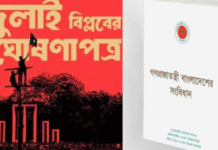Major international news media has published the news of sentencing a former Islamist leader to death for crimes against humanity. However most of them commented on the internal skepticism, as well international concerns expressed by such groups as Human Rights Watch about the ‘International Standard’ of the ‘International Crimes Tribunal’ conducting the trial.
‘Late last year the tribunal was shaken by newspaper revelations which led to the resignation of the presiding judge of one of the two courts. But the government was quick to appoint a new judge, and the tribunals pressed ahead with proceedings, leading to Monday’s first verdict’- recalled BBC.
Abul Kalam Azad, a former leader of the Jamaat-e-Islami party, was found guilty in abstinent on eight charges.
Mr Azad, who had gained fame in recent years as a television presenter of Islamic programmes, was accused of murder, rape, torture, arson and looting – mostly against members of the Hindu community in the central district of Faridpur.
He went on the run in April last year and is thought to be in Pakistan.
A ‘quick’ verdict: political influence
There was political influence to get this case heard and disposed of before all the other as is evident from the Skype Conversation between the former Chairman of the International Crimes Tribunal-1 and Dr. Ahmed Ziaudddin, an expatriate Bangladeshi lawyer based in Belgium, who was assisting the Tribunals from behind the scenes.
In a conversation on 14 October, 2012 (reported in Amar Desh on 9 December, 2012) Dr. Ziauddin suggests exerting pressure on Tribunal-2 from a ‘higher level’ to slow down Abdul Quader Mollah’s case and to deal with the case of Azad, (which was being heard in absentia) first.
Dr. Ziauddin told the former Chairman, “They [the Tribunal-2] have to be directed from a higher level that they should slow down things in [Abdul] Quader Mollah’s case. Slow it down and bring the others forward. Let them begin with the case of that absent accused, …..what his name …. Bachhu [i.e. Abul Kalam Azad].” (Translated from Bangla).
This conversation took place on 14 October, 2012. By such date the trial of Abdul Qauder Mollah was well advanced. 12 PWs had already been examined. On the other hand charges had not even been framed by the Tribunal-2 at this stage in the case of Abul Kalam Azad. On 4 November, 2012, 20 days after the above conversation AKA was indicted. On 26 November, 2012, the prosecution opened its case and examined the first witness.22 Prosecution Witnesses were quickly examined, and the Prosecution case was closed on 22 December, 2012, (within less than a month). No defence witness was examined. Both the Prosecution and the Defence concluded their summing up on 26 December 2012.
To most of the observer of the proceedings of the ‘Tribunal’ these ‘quick steps’ towards a major verdict of death sentence is nothing but to assure the people of Bangladesh that ‘everything is going fine in Tribunal’ and Awami League is in line with ‘fulfilling its election promise’ before the forth-coming election.
Monday’s verdict goes some way to reassure the public that the trial process has not lost its way, commented BBC.
BBC termed the verdict as ‘a major triumph for Prime Minister Sheikh Hasina who has made prosecution of 1971 war crimes a key goal of her government.’
Pressure from Muslim World
Recently, Turkish President Abdullah Gul wrote to his Bangladeshi counterpart, calling on him not to put Ghulam Azam to death if he is found guilty.
Internationally renowned Islamic leaders also expressed their concerns over ‘injustice on Muslim leaders’ in the name of war crime tribunal.
The ruling alliances of Bangladesh are now concern that more and more protests from Muslim Countries might come in near future.
The ‘quick’ verdict is somehow a signal passed to Muslim Countries not to interfere in Bangladesh’s judicial process.
Judge Hasan blamed Jamaat one of the major party in 18 party opposition alliances and said the impunity that war criminals enjoyed had “held back political stability, saw the ascent of militancy and destroyed the constitution”, which clearly showed the political agenda behind the verdict to crush Islamic activities in Bangladesh.
Concerns of International human rights groups
Commenting on the news the Guardian of UK reminded that, International human rights groups have raised questions about the conduct of the tribunals set up by the government in 2010 to prosecute accused of war crimes.
The paper also mentioned the concern of New York-based Human Rights Watch’s complains about flaws in the process.
‘Farcical’ case-ABC News
ABC news in its news heading ‘Televangelist to hang for Bangladesh war crimes’ commented the verdict as ‘Bangladesh’s controversial war crimes court probing the nation’s bloody independence war has sentenced a top Islamic televangelist to death in its first conviction.’
The International Crimes Tribunal (ICT), which is a domestic tribunal with no international oversight, was created by the government in 2010 and has been tainted by allegations that it is politically motivated.
Both Jamaat and BNP have called the cases “politically motivated and farcical” and international rights groups have questioned the proceedings and found loopholes in the war crime laws.
Abdus Shukur Khan, a tribunal-appointed defence lawyer for Azad, said the case was “false”- reports ABC
“He was not involved in any of these crimes and was never named a Pakistani collaborator in any of the war books,” he said.
The incidents cited in the charges “might have taken place, but my client was not involved in such crimes,” Khan, the lawyer, told reporter Arun Devnath of Bloomberg news.
Skype ‘scandal’
In almost all the media the issue of ‘Skype scandal’ came up.
A judge presiding over another tribunal resigned last month after the Economist reported that it had records of Skype and email conversations between him and a Belgium-based Bangladeshi lawyer that raised serious questions about the workings of the tribunal.
The exposure came just days before the court was due to deliver the verdict in the trial of Delwar Hossain Sayeedi, a top Jamaat leader and one of the country’s most charismatic Islamic preachers.
Azad is also regarded as widely accepted Islamic cleric, who for years presented a widely watched show on Islam on private and state-run television channels.
BBC, The Guardian, The Vancouver Sun and AFP mentioned the incident in details.
The tribunal itself suffered a set-back last month, when hours of conversation over Skype between one of its presiding judges and a Brussels-based lawyer were revealed in the press.
Defence lawyers claimed the judge had acted improperly and the conversation showed the accused could not expect a fair trial.
The judge swiftly resigned, triggering calls for the trial of Mr Sayeedi to be recommenced from the beginning.
The tribunal’s new presiding judge rejected the calls for retrial, but agreed to have the two legal teams make their final submissions again.
Monday’s verdict goes some way to reassure the public that the trial process has not lost its way.
“But a number of the trials have significant due process shortcomings, have become highly politicized and more recently evidence of collusion between the prosecutions, government and a tribunal judge has emerged,” war crimes researcher David Bergman told AFP.
More ‘quick verdicts’ to follow
Observers now expect the verdicts in the cases of senior Jamaat-e-Islami leaders such as Mr Sayeedi and Mr Azam to follow rapidly.
Verdict against Abdul Quader Molla, assistance secretary general of Bangladesh Jamaat-e-Islami may be issued any day form now.
The ruling party is more concern about fulfilling its ‘election promise’ rather than the acceptability of ‘quick verdicts’ by its own countrymen and International bodies.
Source: BDINN









